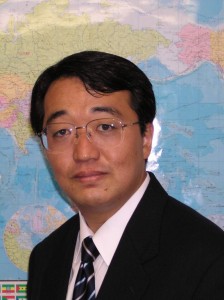緊張と統合:内村鑑三におけるキリスト教と日本の精神
このシリーズでは、私が1994年に執筆した統一神学大学院(Unification Theological Seminary)の神学課程修士論文(Divinity Thesis)を日英二か国語で掲載している。
今回から第4章の「日本文化とキリスト教の統合」に入る。
4.日本文化とキリスト教の統合
A.土着化に対する無教会の見解
キリスト教を日本に土着化させることは、内村の最も根本的な関心事であった。内村はアメリカから日本に帰った後、北越学館というアメリカの宣教師達が教師の大半を占める学校の教頭を勤めた。ここで彼は宣教方法の関する意見の不一致により、教頭職を辞任して宣教師達との協力に見切りをつけることとなった。彼は学生達の心に福音の種を蒔く前に、伝統的な日本の模範と美徳とによってその精神を耕そうと欲した。宣教師達は直接キリスト教を教えることを主張したが、内村は未熟な学生達を即席のキリスト教徒にしようとする試みに反対したのである。彼から見れば、真に日本的なキリスト教の実を結ぶには、まだ期は熟していなかったのである。
内村はどういうわけか、日本に神の摂理が働いていることを信じており、日本の使命は西欧の諸国と他のアジアの国々を連結することであると考えていた。内村は初期の論文の一つで、目的論的視点に立つ地理学の科学的研究で有名な、カール・リッター(1779年~1859年)とアーノルド・ギョー(1807年~1894年)の研究を基にした世界史の理論を概説した。内村は、地球の物理学的特徴が文明の諸相に基本的な影響を与えるということ、そしてこれを基にして、文明の未来を予言することができるという彼らの仮説を採用した。内村はこの理論に彼の信仰を加えることにより、いかに神の摂理が様々な地理学的な配置を通して、人類の発展と各国の使命に影響を与えて来たかを見ることが出来たのである。この理論の脈絡の中において、内村は神の摂理における日本の位置を修辞学的に問いかけている。
日本の使命とは何であるか。日本は世界のために何ができるのか。もし文明がエジプトとバビロンで始まり、フェニキアが分散し、ユダヤが浄め、ギリシアが磨き、イタリアが保存し、ドイツが改革し、イギリスが和らげ、そしてアメリカが実行したとすれば、日本にはもう何もなすべき事は残されていないのであろうか。(原英文、魚谷訳)
IV. Synthesis of Japanese Culture and Christianity
A. The Mukyokai View of Indigenization
Indigenization of Christianity in Japan was Uchimura’s most fundamental concern.After returning to Japan from the United States, Uchimura administered a school, Hokuetsu Gakkan, which was manned largely by American missionaries. Here, his disagreement over evangelical methods led him to resign and forsake cooperation with missionaries. He wanted to cultivate students’ spirit by traditional Japanese examples and virtues before seeding with the Gospel. While missionaries insisted on teaching Christianity directly, Uchimura undermined efforts to make instant Christians out of immature students. For him, it was not the time of harvest to bear fruit of a truly Japanese Christianity.(1)
Somehow he believed in God’s providence working in Japan, and thought that the mission of Japan was to connect the Occidental countries with the other Asian countries. One of Uchimura’s early essays outlined his theory of world history, which was based on the works of Karl Ritter (1779-1859) and Arnold Guyot (1807-1894), both famous for the scientific study of geography from a theological perspective.(2)Uchimura adopted their premise that the physical characteristics of the earth have a most fundamental influence on the development of a civilization, and that, knowing this, it is possible to predict the future course of the various human civilizations. By adding his faith to this theory, Uchimura was able to perceive the ways in which Divine Providence had affected the development of mankind and the mission of each country through various geographical configurations. Within the context of this theory, Uchimura rhetorically asks Japan’s place in divine providence:
What is Japan’s mission, or what can she do for the world? If Egypt and Babylon started civilization, Phoenicia dispersed it, Judea purified it, Greece polished it, Italy preserved it, Germany reformed it, England tempered it, and America executed it, is nothing more left for Japan to work upon it?(3)
(1) Norihisa Suzuki, Uchimura Kanzo Jitsuroku 1888-1891: Ichikou Fukei Jiken [A daily Record of Kanzo Uchimura 1888-1891: The Lese Majesty Incident at Ichiko]. (Tokyo: Kyo Bun Kwan, 1993), vol.1, p.7-58.
(2)Uchimura, “Chijinron (The Earth and Man),” in Zenshu [Collected Works], ed. Suzuki Toshihiro, Tokyo: Iwanami Shoten, 1932, vol. I, pp.545-552.
(3)Uchimura, Zenshu, XVI, p.17.
